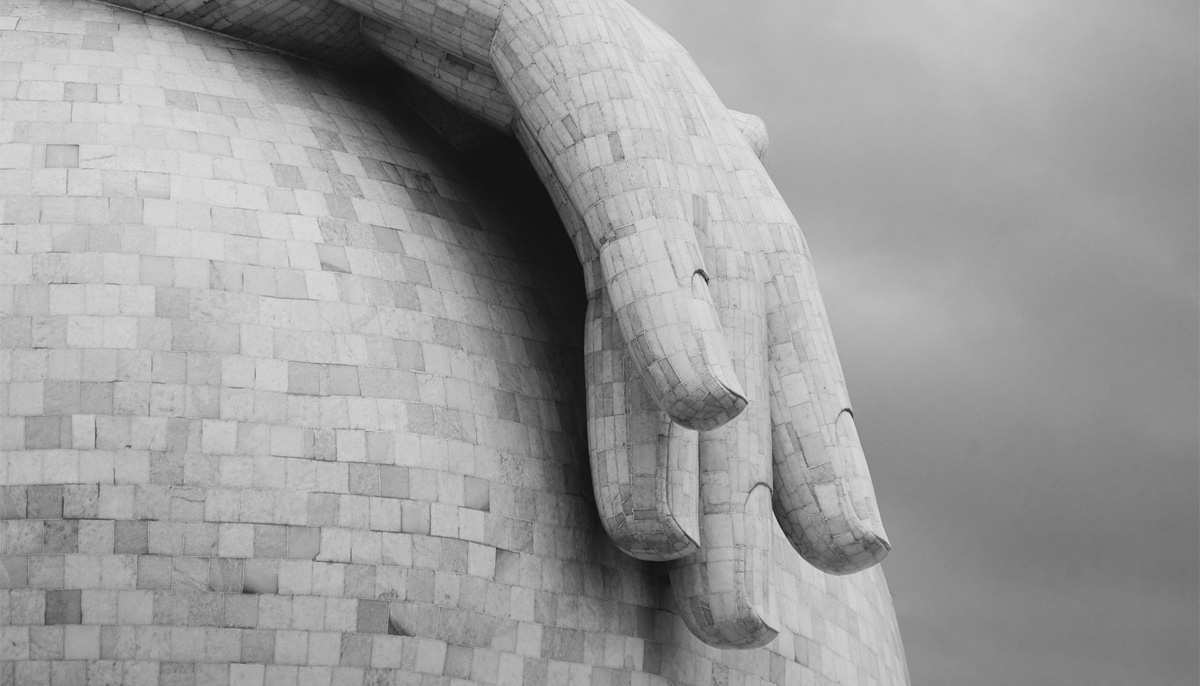In a university class I taught last semester, students talked about their relationship to the U.S. flag in the corner of the classroom. One student spoke of feeling distant from the flag because of their ethnic heritage. Another because she practiced a minority religion. Others still because they identified as LGBTQI. I was shocked and saddened. “America is for all of us,” I declared, “Even myself a British Buddhist immigrant!” Yet, for these students, who made up the most diverse class in terms of race, gender and sexual identities that I have taught since joining my university in 2012, the flag signified a nation that was for white heterosexual Christians only. It represented a nation that they did not feel they were fully included in so could not feel they fully belonged to.
We touch the earth. We know we are supported by truth.
Perhaps I shouldn’t have been shocked by my students’ alienation. After all, even the most recent history of the U.S. is a history of the fight for inclusion. In 1954, segregation between Black and white American children in public schools was ruled unconstitutional. The Civil Rights Act of 1964 outlawed discrimination based on race, color, religion, sex and national origin. The Asian Exclusion act that banned immigration from Asia was lifted in 1965. In 1967, race-based restrictions on marriage ended. In 2003, sodomy laws that criminalized gay sex were ruled unconstitutional. Same-sex marriage was only legalized in 2015. The Crown Act that prohibits discrimination against Black hairstyles was passed in 2020.
The movement towards creating a nation in which all people, regardless of their race, religion, gender or sexual orientation, are included is a response to a long history of structural exclusion, harm, and violence. As part of that movement, Buddhist communities, such as the Buddhist Churches of America and the Soto Zen Buddhist Association, have vowed to transform “deep-rooted,” and “structural” racism in the US. The University of Central Florida, like many other academic institutions, issued a statement acknowledging, “What is needed now is action — a commitment from our university to not merely celebrate our diversity, but to be actively anti-racist. Systemic racism, sexism, homophobia and other hateful ideologies seek to deny our shared humanity. They must be called out and confronted. They do not reflect the values of our UCF community.”
A collective awakening has been happening. An awakening to the exclusions and harms that People of Color, and other marginalized groups, have been systemically subject to. An awakening to the causes and conditions of those harms. And, an awakening to the urgency of ending such harms through awareness and action. Simply put: suffering, the causes of suffering, the end of suffering, and the path to the end of suffering.
Yet, as all Buddhists know, the path to awakening is not an easy one. Even the Buddha was visited repeatedly by Mara. Unlike Mara who often came disguised in his futile efforts to deter the Buddha, however, this obstacle announced itself brazenly: STOP WOKE.
On December 15 2021, Florida Republican Governor Ron DeSantis announced the STOP WOKE Act (The Stop the Wrongs To Our Kids and Employees Act) designed to “give businesses, employees, children and families tools to fight back against woke indoctrination.” DeSantis presented the bill as opposing “the state-sanctioned racism that is critical race theory” and continued: “We won’t allow Florida tax dollars to be spent teaching kids to hate our country or to hate each other.” Commissioner of Education Richard Corcoran claimed that students were under threat by Critical Race Theory advocates who were imposing their values on students instead of “empowering students with great, historically accurate knowledge.”
The claim that Critical Race Theory (CRT), legal-based scholarship that is taught in upper-level university courses, is being taught in K-12 education is absurd. Rather under the name of CRT, conservatives have taken aim at a wide range of education material that seeks to promote racial awareness and cultural inclusivity. In the case of Florida, this resulted in the removal of 54 math books. As evidence for why these books were banned, the state eventually produced just four screenshots, which included a statistical analysis of racial prejudice and a reference to a social and emotional learning objective of “empathizing with classmates.”
The Stop WOKE Act is part of a nationwide coordinated backlash to the awakenings to social harm and injustice. It was pioneered by conservative advocate Christopher Rufo who has been transparent about his goal to demonize Critical Race Theory. As he put it, “We have successfully frozen their brand—”critical race theory”—into the public conversation and are steadily driving up negative perceptions. We will eventually turn it toxic, as we put all of the various cultural insanities under that brand category.”
Stop WOKE at Public Universities
Given that DeSantis has marketed The Stop WOKE Act bill as a way to protect [certain] children and empower [certain] parents, I naively assumed it would only be applicable to K-12 schools. However, under House Bill 7 (HB 7), which went into effect on July 1st 2022, Desantis has extended his ideological war against history, public education, and freedom of speech to the 12 universities and 28 colleges that make up the State University System of Florida.
HB 7 prohibits teaching eight specific concepts. Several of these concepts emphasize that it is prohibited to teach that individuals are inherently or necessarily racist or oppressive. Ironically such claims would be discredited by critical race theory which teaches that race and racism is a social construction that should be understood as a structural rather than individual phenomena.
However, consider the inclusion of “status” as well as “moral character” in number 3 “A person’s moral character or status as either privileged or oppressed is necessarily defined by his or her race, color, national origin, or sex.” How can we teach about structures of social oppression and discrimination without examining social status? A recent report on faculty salary equity at UCF, for instance, showed that female associate professors earn 3.9% less than their male peers and underrepresented minority associate professors earn 4.8% less than their white peers.
Consider also how HB 7 aims to prevent historic facts being critically addressed. Part of number 8, for example, states, it is prohibited to teach that “Such virtues as merit, excellence, hard work, fairness, neutrality, objectivity, and racial colorblindness are racist or sexist.” I think about my course on religion and medicine in which we examine the history of racism in biomedicine and how it has functioned under the guise of objectivity. Take, for instance, John Sims gynecological experiments on Black female slaves done without anesthesia because “objective” science stated Black people did not feel pain in the same way as white people. As numerous studies show, false beliefs about biological differences between Black and white people continue to produce racial inequities in medical treatment.
While “objectivity” might not have been “created” for racist purposes, there is no doubt that historically it has functioned—as have the other “virtues” in this list—to support and reproduce racist assumptions, practices and policies.
HB 7 adds that specified concepts can be discussed so long as the instruction is “given in an objective manner without endorsement of the concepts.” In short, the bill seeks to control not just what we teach, but how we teach. I think about a class I teach on ex-gay conversion therapy. Should I, a married lesbian professor with LGBTQI students in my classroom, not endorse laws that protect LGBTQI youth from being dragged out of their bed at night and taken to correction camps where they are subject to aversion shock therapies?
Touching the Earth
As a Buddhist, I turn to the story of the Buddha’s awakening as an inspiration for how I can respond skillfully to HB 7. I think of Mara’s final attempt to stop the Buddha. How he challenged the Buddha to defend the truth of his awakening. The Buddha smiled and touched the earth and it called out as his witness.
Ground as support. Truth as antidote.
The Stop WOKE Act and the HB 7 bill have fabricated a problem that does not exist. One of the rudimentary analytic skills we teach our undergraduate students is the difference between an unfounded “opinion” and a data supported thesis. HB 7 is the former. It provides no data to support its claim that UCF students are being indoctrinated, excluded, or emotionally harmed.
On the contrary, the data that does exist shows the exact opposite. Take, for instance, our annual Student Perception of the Instruction (SPIs). Between 2017-2021, for the criteria of “Showing Respect and Concern for Students,” the College of Arts and Humanities average range was 4.41 to 4.49 out of 5. My own average range for the same time period was 4.59 to 4.73. In my department, professors who teach about colonialism, systemic racism, gender and sexuality, have won multiple teaching awards. The application for these awards includes not only SPI scores but evidence of student success and student letters of support that attest to the transformative impact of our teaching.
I think back to my course. In our last class, we sit in a circle and share what impacted us most. One student captures our collective mood. This semester, she says, we created an America in which we all belong. The we was a big we: Hindu, Christian, atheist, Satanist and Buddhist, white, Black, and Brown, straight, gay, bi, and queer, they/theirs, she/hers and he/his.
These are the type of classes, students and professors that the Stop WOKE Act and HB 7 has targeted. But we won’t be deterred. We touch the earth. We know we are supported by truth. We know we are supported by each other.
This article was created in collaboration with Buddhist Justice Reporter (BJR), founded by BIPOC Buddhist practitioners in response to the police torture and murder of George Floyd. BJR publishes articles on issues related to environmental, racial, and social justice and its intersections, from an anti-racist Buddhist lens.

